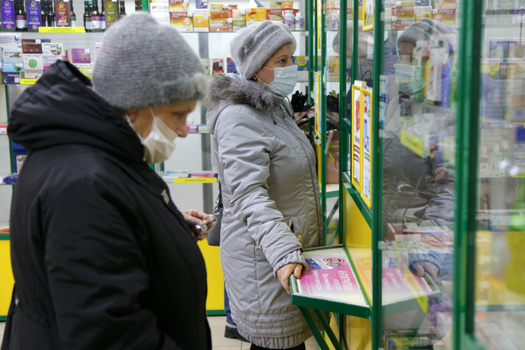
‘The drugs have disappeared’ Pharmacies across Russia are running out of medications used to treat COVID-19, but increased demand isn’t the only problem
Мы рассказываем честно не только про войну. Скачайте приложение.
Since late October, residents of regions across Russia have complained about the fact that antiviral medications and antibiotics, including those used to treat the coronavirus infection, have disappeared from local pharmacies. In particular, these shortages have been reported in Novosibirsk, Saransk, Vladimir, Yekaterinburg, Kazan, Kostroma, Tula, and many other cities.
Even Moscow pharmacies are lacking antibiotics and antiviral drugs. Meduza’s correspondent stopped by eight pharmacies in various Moscow neighborhoods and none of them had Levofloxacin (brand name Levaquin) or Azithromycin, the most commonly prescribed antibiotics even before the pandemic. They were also all sold out of the antiviral medications Ingavirin, Arbidol, and Triazavirin. At two of the pharmacies, the staff told Meduza that “all stockpiles had been sent to hospitals.”
Do these drugs actually help fight COVID-19?
Unfortunately, using these drugs in cases where the patient’s condition allows for at-home treatment doesn’t make sense. In Russia, doctors prescribe antibiotics for COVID-19 very actively, though this is rarely justified: bacterial pneumonia occurs in only seven percent of hospitalized patients. The antiviral drugs that are prescribed actively in Russia for the coronavirus and acute viral respiratory infections are not included in the main international and national clinical guidelines. Worldwide, antiviral medications, the effectiveness of which have only been studied during the coronavirus pandemic, aren’t recommended for patients being treated at home, because of the risk of adverse reactions may outweigh any potential benefits.
Another medication missing from pharmacies across the country, including in Moscow, is the anticoagulant Clexane, which is used in combination treatments for COVID-19. Russia’s Health Ministry has acknowledged the Clexane shortage at pharmacies, attributing it to increased demand for the drug. “All medical organizations are being fully provided with Clexane and its analogues, and they also have necessary reserves of them,” the Health Ministry assured.
Health officials are attributing the other drug shortages to increased demand, as well. “People are buying up everything that’s being supplied,” said Novosibirsk Regional Health Minister Konstantin Khalzov. During a meeting of the federal headquarters for the fight against COVID-19 in early November, Russia’s Industry and Trade Minister Denis Manturov said that “logistics and retail need time to adapt to the increased demand.”
“The drugs that were prescribed by the tons during covid have disappeared,” a source from a federal hospital confirmed in conversation with Meduza.
In turn, another Meduza source close to the Health Ministry’s leadership maintains that the deficit is linked not only to the increased demand for medications (primarily those used to treat the coronavirus), but also due to the country’s updated labeling requirements. Russia introduced new mandatory labeling requirements as of July 1, in order to track every package of medication from the moment of its production or importation into the country to its final sale.
In October, it became known that one major pharmaceutical company — Gedeon Richter-Rus — had announced the suspension of drug supplies to Russia due to a “technical failure” in the Drug Movement Monitoring system. According to a letter from the pharmaceutical company to its counterparts that leaked to the press, this problem has been ongoing since September 30, and as a result, among other things, it has been impossible to get medications cleared.
The operator behind the labeling system for medications, the Center for the Development of Advanced Technologies (CRPT), told the Russian state news agency TASS that there was an incident with the system on September 30, “caused by a technical factor,” but claimed that the problem had already been resolved. However, the website Pharmvestnik.ru also reported failures in the drug labeling system in mid to late October.
The head of the International Pharmaceutical Manufacturers Association, Vladimir Shipkov, confirmed that there have been ongoing problems. “Members of our association are complaining that their products are stuck at customs and with distributors,” he told Meduza.
In response to a question from journalists about the system failure on October 23, presidential spokesman Dmitry Peskov stated that the Kremlin didn’t have any information about what happened. “This is completely and utterly a question for the cabinet. You need to address this question exactly there,” Peskov said.
Prime Minister Mikhail Mishustin responded by signing a decree simplifying the procedure for working with the labeling system in early November. In particular, it allows pharmacies to sell medications without waiting for confirmation of registration from the system. According to the government’s website, this simplified procedure will be in operation “until all industry participants are fully prepared” and will apply to all actions involving medications manufactured or imported after July 1, 2020.
Translation by Eilish Hart